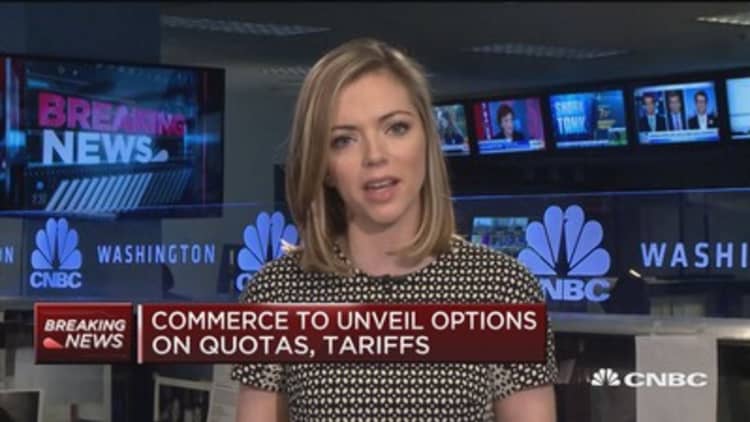
The Commerce Department on Friday recommended imposing heavy tariffs or quotas on foreign producers of steel and aluminum in the interest of national security, following a trade investigation of imports.
President Donald Trump and his administration announced the so-called Section 232 investigation into steel and aluminum imports in April. The investigation sought to determine whether the imports posed a threat to the country's national security.
On Friday, Commerce Secretary Wilbur Ross reported that steel is in fact important to U.S. national security, and current import flows are adversely impacting the steel industry.
"[T]he Secretary of Commerce concludes that the present quantities and circumstance of steel imports are 'weakening our internal economy' and threaten to impair the national security as defined in Section 232," the department said.
In a 262-page document, Ross recommended a couple alternatives for the president to take "immediate action by adjusting the level of imports through quotas or tariffs." The department's goal is to increase demand for American-made metals.
Trump must respond to the reports by April 11 and 19 for steel and aluminum, respectively.
Among the recommendations in the reports are a global tariff of 24 percent on all steel imports.
An alternative option would target 12 countries, including China and Brazil, who export the most cheap steal to the U.S. Those countries would be charged new tariffs of 53 percent or higher. In this scenario, countries not listed in the list would see US imports capped at the amount they imported in 2017.
A third option would institute a quota on steel imports from all countries, up to 63 percent of what those countries imported in 2017.
The aluminum recommendations include a 7.7 percent tariff on imports from all exporter nations. Ross separately suggested a 23.5 percent tariff on aluminum products from China, Hong Kong, Russia, Venezuela and Vietnam, with a cap for all countries at 2017 import levels.
An aluminum import quota on all countries of 86.7 percent of their 2017 imports was also an option detailed in the report.
Trump could determine that specific countries should be exempted from the proposed quota, based on the economic or security interests of the United States. The president could also consider the countries' willingness to work with the United States to address global excess capacity and other challenges facing the U.S. aluminum and steel industries.
Companies can also seek appeals based on U.S. production of steel and aluminum and specific national security-based considerations.
Ross said each of the measures should enable U.S. steel producers to operate at 80 percent average capacity utilization rates or better based on available capacity in 2017.
According to the Aluminum Association, there are five U.S. smelting facilities that are operating with three partial curtailments. This is a fraction compared with the 24 operational smelters up and running in 2001.

